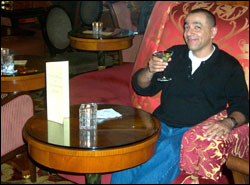POSTCOLONIAL STUDIES is the broad academic field that scrutinizes the experience of people who were subjected to colonial rule. Indian-born Salman Rushdie is postcolonial. Iran’s Ayatollah Khomeini tried to kill him, and he was postcolonial, too.
The University of Washington is not postcolonial, but like Rushdie and Khomeini, its postcolonial-studies stock is soaring. The university’s Title VI grants for language and area studies grew to a record $3.5 million this year, up from $2.9 million in 2002.
But to paraphrase Dickens (not postcolonial), the best of times for the University of Washington is also the worst of times. Congress is debating legislation that would give the Department of Homeland Security a key role in administering area-studies centers across the nation. With its many area-studies and language offerings, in subjects as diverse as Urdu and Finnish, UW is bracing for the new law.
Predictably, UW’s area-studies centers do not have great expectations of the legislation, H.R. 3077, which was introduced by House Republicans. The International Studies in Higher Education Act of 2003 would overhaul Title VI, a federal law that governs funding for area-studies at National Research Centers (NRC), of which the UW has seven, and for Foreign Language and Area Studies (FLAS) fellowships. FLAS awards support the educational and research needs of individual scholars. To become an NRC, a university must design and host a nationally competitive program in the language, literature, or civilization of a specific world area or culture.
The federal government awards the funds, and competition to get them is tough. UW’s centers went head to head this year with the best in the nation. At a time when interest in the Arab world is increasing, the Middle East Center was the fourth-best funded of 17 Middle East centers nationwide.
THE SOUTH ASIA Center at UW trained its first master’s degree candidates in UrduU.S. defense personnel who will be stationed in Quetta, Pakistan, a U.S. listening post in the war against terror. But House Republicans see area-studies centers as anti-American, and the bill proposes to create an “International Educational Advisory Board” to oversee their work. Board members would include representatives of Homeland Security, the Defense Department, and the National Security Agency.
U.S. Rep. John Boehner, R-Ohio, says the new law would “increase accountability by providing advice, counsel, and recommendations to Congress on international education.” Those are fighting words to professors and teachers for whom academic independence is an article of faith. UW chat rooms are abuzz with news of the new law, and, across the country, faculty members bristle at Republican suggestions that area-studies and language programs are exclusivist or elitist.
ANAND YANG, DIRECTOR of the UW’s Jackson School of International Studies, which houses the university’s area-studies programs, noted in a recent report to Vice Provost Steve Olsweng that Title VI money won by his center benefits the entire UW community. Yang said the center’s reliance on diversity programs ensures that money is distributed to faculty and units across the university. More than $1 million in FLAS awards this year went to the College of Arts and Sciences.
But it’s not just about the money. It’s about the politics. During debate on the bill in the House of Representatives last month, conservatives charged that liberal faculty members who teach in area-studies and language programs are “unpatriotic.” One of the bill’s backers, Phil Gringrey, R-Ga., is also co-author of an “Academic Bill of Rights” being bandied about campuses by conservative groups intent on winning their freedom from overbearing postcolonialists.
The H.R. 3077 debate’s centerpiece was testimony provided to Congress last summer by Stanley Kurtz, a Hoover Institution research fellow and columnist for the National Review Online. In a coincidence worthy of a magical realist tale penned by Gabriel Garciá Márquez, Kurtz shares his last name with a character in Joseph Conrad’s Heart of Darkness, a text that is often taught in postcolonial courses. Kurtz portrayed area-studies centers as hotbeds of venal anti-Americanism. He focused on postcolonial theory in particular and targeted one of the field’s pioneers, the Palestinian-American scholar Edward W. Said (coincidentally, a Conrad specialist). Said was in the final stages of a protracted struggle with leukemia and wasn’t there to respond. The bill was introduced Sept. 11. Said died Sept. 25.
Assailing Said’s 1978 book, Orientalism, Kurtz argued that “the core premise of postcolonial theory is that it is immoral for a scholar to put his work or knowledge of foreign languages and cultures at the service of American power.” The UW-educated, Pakistan-bound U.S. Army Urdu scholars, and others like them who benefit from area-studies offerings across the country, were not invited to the hearing.
Kurtz told the committee that faculty members at area-studies centers discourage students from becoming U.S. diplomats and CIA spies, and Congress should create an oversight board linking Title VI funding to students pursuing CIA, defense, and foreign- service careers. Despite the tenuous connections of his logic, Republicans accepted his proposal. The idea of an all-knowing international education board staffed by intelligence gurus was born. H.R. 3077 was passed by the House and is before the Senate Health, Education, Labor, and Pensions Committee.







